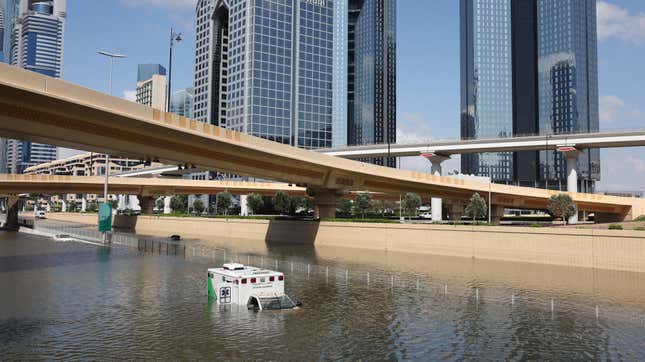
The United Arab Emirates was hit with historic flooding on Tuesday after roughly a year’s worth of rain fell in just a single day. The record rainfall, more than four inches at the Dubai airport and 10 inches elsewhere in the country, caused some people online to speculate it was all caused by cloud seeding. But the UAE’s National Center of Meteorology released a statement to CNBC on Wednesday denying the claims.
As the Washington Post points out, meteorological models predicted heavy rain in the UAE a week earlier, and officials in the country denied contributing to excess rain for precisely that reason.
“We take the safety of our people, pilots, and aircrafts very seriously. The NCM does not conduct cloud seeding operations during extreme weather events,” the deputy director general of the National Center of Meteorology told CNBC.
The UAE first started cloud seeding in the 1990s, a process that involves aircraft releasing silver iodide into clouds in order to create rain. As CNBC notes, the UAE has been doing this ever since, flying regular missions to help with rain in the arid desert.
Cloud seeding has a long and controversial history. The first known human-created snowstorm was instigated shortly after World War II when a pilot with General Electric’s research lab released dry ice into some clouds near Schenectady, New York. And various weather control programs were investigated in the 1950s as a possible weapon against the Soviet Union during the Cold War.
But it wasn’t until the late 1960s and early 1970s that the U.S. engaged in weather manipulation during the Vietnam War as a way to extend the monsoon season and flood the Ho Chi Minh Trail—the supply lines used by North Vietnam vital to moving soldiers and weapons.
Cloud seeding is a very real thing, though its true efficacy is still up for debate among serious scientists. The real culprit in the extreme weather events we’re seeing around the globe—including this week’s floods in Dubai—has nothing to do with government action, according to the Washington Post. It’s climate change. It’s government inaction that’s left us in this increasingly dire situation, including in the UAE.







